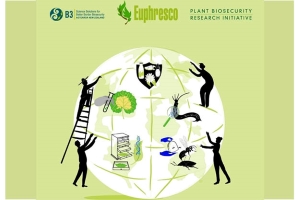Australia, and the rest of the world, continue to face increasing biosecurity threats to our plant, animal industries and native environment. Recent calls for greater global coordination in biosecurity research to strengthen plant health made by global Agricultural Chief Scientists (MACS-G20) held in Tokyo, the International Plant Protection Convention (IPPC), the International Bioeconomic Forum (IBF) plant health working group and in a joint article on science diplomacy in Nature Plants, led by Euphresco coordinator, Baldissera Giovani. Protecting plant health on a global scale supports seven of the UN goals.
Euphresco, the Plant Biosecurity Research Initiative (PBRI) and B3NZ, used the recent First International Plant Health Conference held in London in September 2022, as an opportunity to host a workshop and a conference side session to explore options for the global coordination for plant health research. Participants included CABI, CIHEAM, INIA, DEFRA, ACIAR, B3 and Euphresco and conference delegates
“Collaborating on plant health research with global partners means that we are not duplicating investment in plant health research, we are able to share valuable experience and expertise on how to detect and manage destructive plant pests and pathogens, rather than duplicating our efforts,’” said PBRI Program Director Jo Luck.
“Euphresco has already made inroads into establishing global networks, which provides an excellent foundation to build on.”
The workshop, held before the Conference, consisted of a small group with substantial international plant health interests and activity. The workshop covered such issues as network membership, governance, resources, and suggested activities. The PBRI Program Director led the discussions on suggested activities for global participation such as collaborative plant health research on food security, climate change and sustainable pest management. Other ideas suggested were capability building through support of student networks, research extension and outreach, and knowledge exchange through targeted workshops, webinars and conference or global laboratory exchanges. Raising the profile of plant health research collaboration, through coordinated communication, targeting the International Day of Plant Health was also discussed.
The Conference side session included approximately 100 delegates from around the world. It included five presentations of effective global research co-ordination in plant health administered through Euphresco followed by facilitated discussion with those present. The PBRI Program Director presented research led by Geraldine Anthoine (ANSES, France) in collaboration with European countries and Australia Toni Chapman (DPI NSW) on the detection of Xylella fastidiosa in dormant plant material such as almonds, cherries, and grapevine as an example of international collaboration.
The workshop and side session indicated wide support for the concept of global coordination for plant health research – an important prerequisite for moving forward. Next steps include a writing a joint white paper to explore tangible options for such an initiative and a follow-up session to explore further options at the International Congress on Biological Invasions in Christchurch in May 2023.

